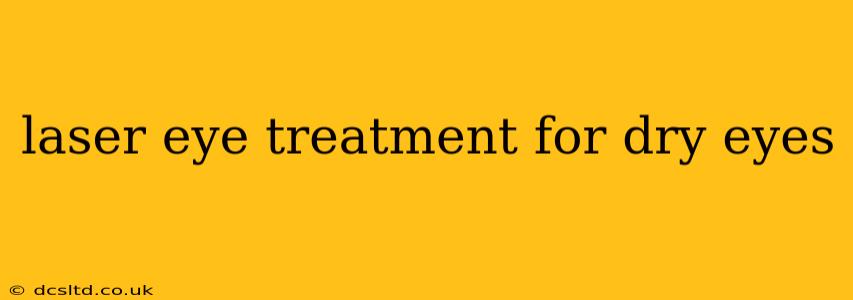Dry eyes are a common condition affecting millions, causing discomfort, irritation, and even impacting vision. While many treatments exist, some individuals explore laser eye treatments as a potential solution. This comprehensive guide will explore the relationship between laser eye surgery and dry eyes, addressing common questions and concerns. We'll delve into whether laser eye surgery can cause dry eyes, if it can treat dry eyes, and what alternatives are available for managing this prevalent condition.
Can Laser Eye Surgery Cause Dry Eyes?
Yes, laser eye surgery, including LASIK, PRK, and SMILE, can potentially worsen pre-existing dry eyes or even induce dry eye symptoms in some patients. This is because the procedures affect the cornea and tear film. During surgery, the corneal nerves responsible for tear production and regulation can be inadvertently damaged. This disruption can lead to reduced tear production, increased evaporation, and a compromised tear film, resulting in dry eye symptoms such as burning, itching, stinging, and blurry vision. The severity of these side effects varies greatly depending on the individual, the type of surgery performed, and post-operative care.
What Types of Laser Eye Treatments Might Impact Dry Eyes?
While all laser eye surgeries carry a risk of dry eyes, some procedures might be associated with a higher likelihood than others. LASIK, for instance, involves creating a flap in the cornea, which can potentially disrupt the delicate nerve structures related to tear production. PRK, on the other hand, removes the outer layer of the cornea (epithelium), and its healing process might temporarily exacerbate dry eye symptoms. SMILE, a less invasive procedure, generally has a lower incidence of post-operative dry eyes, but the risk remains.
Can Laser Eye Surgery Treat Dry Eyes?
No, laser eye surgery is not a treatment for dry eyes. It's a refractive procedure designed to correct vision problems like nearsightedness, farsightedness, and astigmatism. While some procedures, such as LipiFlow, utilize thermal pulsations to improve the function of meibomian glands (involved in tear production), this isn't considered a traditional laser eye surgery for vision correction. It directly targets the cause of evaporative dry eye, not refractive errors.
What are the alternatives to laser eye surgery for dry eyes?
Fortunately, several effective treatments for dry eyes are available, and your ophthalmologist will help determine the best course of action based on your individual needs. These options include:
- Artificial tears: These lubricating eye drops are a cornerstone of dry eye treatment, providing temporary relief from dryness and irritation.
- Prescription eye drops: These may contain cyclosporine or other medications to reduce inflammation and stimulate tear production.
- Warm compresses: Applying warm compresses to the eyelids helps to melt and express the oils from the meibomian glands, improving tear film stability.
- Lid hygiene: Gently cleaning the eyelids helps to remove debris and bacteria that can contribute to dry eye disease.
- Punctal plugs: These small devices inserted into the tear ducts can help retain tears, reducing evaporation and improving moisture.
- LipiFlow Thermal Pulsation System: As mentioned above, this thermal pulsation system aims to improve meibomian gland function. This is a procedure that utilizes heat, not lasers for vision correction.
Are there long-term effects of laser eye surgery on dry eyes?
While most patients experience only temporary dry eyes after laser eye surgery, some individuals may experience persistent dry eye symptoms. The severity and duration of these symptoms vary, and careful post-operative care is essential to minimize the risk. Long-term dryness may require ongoing management with artificial tears or other treatments.
Is it safe to have laser eye surgery if I have dry eyes?
Individuals with pre-existing dry eye disease should discuss their condition thoroughly with their ophthalmologist before undergoing laser eye surgery. The ophthalmologist will assess the severity of their dry eyes and determine if the surgery is appropriate. In some cases, managing the dry eyes effectively before surgery may be necessary.
This information is for educational purposes only and should not be considered medical advice. Always consult with an ophthalmologist to discuss your individual circumstances and determine the best course of treatment for your vision and dry eye concerns.
